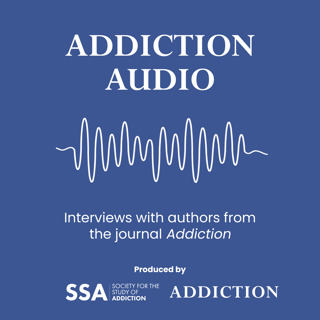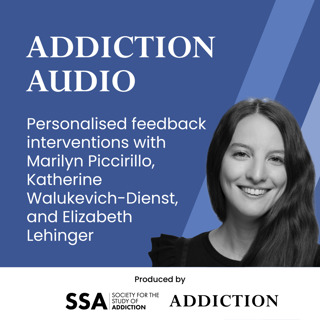
Synthetic opioid production in Europe with Paul Griffiths
In this episode, Dr Elle Wadsworth talks to Paul Griffiths about synthetic drug production in Europe including the differences between lab-made substances and diverted medical drugs. They discuss organised crime and its impact on cocaine production, drug availability and the potential for drug contamination. They also cover fentanyl and the potential for a heroin drought resulting from changes in opium production in Afghanistan.Paul talks about the complexities of European drug markets explaining how they commonly respond to changes in both supply and demand. Elle and Paul then discuss how researchers can monitor drug trends through wastewater analysis and other methods.“These are often very small labs, but because of the potency of these drugs, it means very small production runs can have quite a big impact on local drug consumption patterns and mortality and morbidity. So we saw a few years ago, ten or fifteen years, one lab in central Europe we had a very brief outbreak of deaths in about three countries all related to a very very small, a kitchen lab it was actually in someone’s kitchen but it had an impact.”Paul Griffiths is the scientific director for the EMCDDA – the European Monitoring Centre for Drugs and Drug AddictionOriginal article: Opioid problems are changing in Europe with worrying signals that synthetic opioids may play a more significant role in the future by Paul Griffiths and colleagues. Published in Addiction (2024)The opinions expressed in this post reflect the views of the host and interviewees and do not necessarily represent the opinions or official positions of the SSA or Addiction journal.The SSA does not endorse or guarantee the accuracy of the information in external sources or links and accepts no responsibility or liability for any consequences arising from the use of such information. Hosted on Acast. See acast.com/privacy for more information.
4 Apr 202433min

Alcohol-free drinks in the US with Molly Bowdring
In this episode Dr Merve Mollaahmetoglu talks to Dr Molly Bowdring about her recent article on the impact of alcohol-free drinks such as zero-percent beers, wines and mocktails. Molly talks about using survey data to explore different patterns, such as using non-alcoholic drinks to slow alcohol consumption, to alternate days or as part of someones recovery. Merve and Molly discuss the occasional differences between how people think non-alcoholic drinks change their alcohol consumption and what actually happens to their overall use.If you're somebody who already uses them, be reflective about how is this impacting your desire for alcohol and your consumption in that same night or across the week and just be curious about the relation between your non-alcoholic beverage use and your alcohol use.Original article: Non-alcoholic beverage consumption among US adults who consume alcohol by Molly Bowdring and colleagues. Published in Addiction (2024)The opinions expressed in this post reflect the views of the host and interviewees and do not necessarily represent the opinions or official positions of the SSA or Addiction journal.The SSA does not endorse or guarantee the accuracy of the information in external sources or links and accepts no responsibility or liability for any consequences arising from the use of such information. Hosted on Acast. See acast.com/privacy for more information.
26 Feb 202417min

Gambling advertising with Philip Newall
In this episode, Rob Calder talks to Dr Philip Newall about how the gambling industry frames the evidence on gambling advertising. Philip talks about researching the kinds of bets that are commonly advertised, explaining how they are often projected to be 'good' bets when the chances of winning are very small. "It's really got the two sides of the coin there in that it appears really attractive, but actually it's the bookmaker that's really winning the most. And that's the underlying psychology in how they're able to offer things that seem good but are actually really profitable for them."Philip also talks about how difficult it can be corralling 50 people into co-writing a short letter.Dr Philip Newall is a lecturer in psychological science at the University of Bristol, a member of the Advisory Board for Safer Gambling (although speaking on this podcast in an independent capacity) and the joint winner of the Society for the Study of Addiction’s Impact Prize in 2023.Original article: No evidence of harm’ implies no evidence of safety: Framing the lack of causal evidence in gambling advertising research by Philip Newall and colleagues. Published in Addiction (2023)The opinions expressed in this post reflect the views of the host and interviewees and do not necessarily represent the opinions or official positions of the SSA or Addiction journal.The SSA does not endorse or guarantee the accuracy of the information in external sources or links and accepts no responsibility or liability for any consequences arising from the use of such information. Hosted on Acast. See acast.com/privacy for more information.
8 Feb 202432min

Addiction and definitions with Robert West
In this episode Zoe Swithenbank talks to Professor Robert West about his work on ontologies within addictions. Robert begins by summarising the definitions and constructions that relate to addiction, as well as their meanings and the implications for treatment. He also explains how different definitions can frustrate progress in addiction-related research.Zoe and Robert then discuss how the addictions sector can learn from other sciences - particularly the biological sciences - about how to use those definitions, labels and ontologies to aid research. Robert covers the work on AddictO Vocab (https://addictovocab.org/) and explains the goal to develop a well-defined construct for anything that anyone might want to refer to in a research paper."Ontologies are very specific ways of representing the world that have been developed primarily for use in computer science and data science.... They are very formal systems for representing things called entities. Entities are literally anything you can imagine whether it's real or not real. So 'unicorn' for example, can be an entity for example, as can 'addiction' - as can 'horse'."Original article: Achieving consensus, coherence, clarity and consistency when talking about addiction by Robert West and colleagues. Published in Addiction (2023)The opinions expressed in this post reflect the views of the host and interviewees and do not necessarily represent the opinions or official positions of the SSA or Addiction journal.The SSA does not endorse or guarantee the accuracy of the information in external sources or links and accepts no responsibility or liability for any consequences arising from the use of such information. Hosted on Acast. See acast.com/privacy for more information.
19 Dec 202318min

Nitrous oxide, addiction and substance use disorder with Sammie Back and Emese Kroon
In this episode Dr Elle Wadsworth talks to Sammie Back and Emese Kroon about nitrous oxide. The discussion happened on 8 November 2023, on the day that possession of nitrous oxide became a Class C substance in the UK. The group discuss the existing evidence for harms, addiction and other disorders, exploring this relatively under-researched area. They cover the lack of research and how researchers can begin to understand what's happening when a drug's popularity rapidly increases. They also talk about how people use nitrous oxide and in which circumstances use might be more likely. Finally, they relate nitrous oxide against criteria for substance use disorders taken from DSM-5 and discuss the implications from their findings. "We just need more data.... For a drug used this regularly, it's honestly quite astounding that we have so little scientific evidence to inform the public also healthcare professionals and policy makers." Emese KroonOriginal article: Does nitrous oxide addiction exist? An evaluation of the evidence for the presence and prevalence of substance use disorder symptoms in recreational nitrous oxide users by Sammie Back and colleagues. Published in Addiction (2023) The opinions expressed in this podcast reflect the views of the host and presenters and do not necessarily represent the opinions or official positions of the SSA or Addiction journal.The SSA does not endorse or guarantee the accuracy of the information in external sources or links and accepts no responsibility or liability for any consequences arising from the use of such information. Hosted on Acast. See acast.com/privacy for more information.
12 Dec 202324min

Pregnancy and opioids with Jerry Cochran
In this episode Ben Scher talks to Professor Gerald (Jerry) Cochran about his article based on a randomized multisite pilot trial investigating the impact of Patient Navigation. Jerry begins by describing Patient Navigation, explaining how it works and how it can help people stay engaged in care. The research team explored whether this approach helps pregnant people to stay in contact with treatment services.Jerry then go on to discus the next steps for his research and explains how his research findings might be scaled up to influence policy. Jerry describes how Patient Navigation could be implemented within US Medicaid programmes summarising the data that would be needed to scale up the intervention. They then reflect on the economic implications for Medicade or state insurers."That's really exiting and it's really satisfying when you're able to identify a partner like a Medicaid programme or a large pharmacy chain.... and help them integrate into their workflow into their systems something that might help patients and think 'oh wow'. You know, not only could we help patients in a single clinic but we could help people in a state or across the country"Original article: Patient Navigation for Pregnant Persons with Opioid Use Disorder: Results of a Randomized Multisite Pilot Trial by Gerald Cochran and colleagues. Published in Addiction (2023)The opinions expressed in this podcast reflect the views of the hosts and authors and do not necessarily represent the opinions or official positions of the SSA or Addiction journal.The SSA does not endorse or guarantee the accuracy of the information in external sources or links and accepts no responsibility or liability for any consequences arising from the use of such information. Hosted on Acast. See acast.com/privacy for more information.
5 Dec 202320min

Minimum unit pricing and road traffic accidents with Francesco Manca
In this episode Rob Calder talks to Francesco Manca about his research on Scotland's Minimum Unit Pricing (MUP) policy for alcohol, and specifically about the impact that MUP has had on road traffic accidents. Francesco discusses how the research team selected appropriate comparitors to assess whether changes to road traffic accidents could be attributed to MUP. He also talks about how this study compares with previous studies that used similar datasets yet drew different conclusions. He describes how understanding the subtle differences between time frames and outcomes can aid researchers to gain an in-depth understanding of alcohol regulation. "The original 50 pence as a floor price .... maybe too low over the years as it can be eroded by external factors such as inflation - so maybe indexing with inflation may create a more consistent effect of the policy over time"Original article: Evaluating the impact of minimum unit pricing for alcohol on road traffic accidents in Scotland after 20 months: an interrupted time series study by Francesco Manca and colleagues. Published in Addiction (2023)The opinions expressed in this podcast reflect the views of the presenter and interviewee and do not necessarily represent the opinions or official positions of the SSA.The SSA does not endorse or guarantee the accuracy of the information in external sources or links and accepts no responsibility or liability for any consequences arising from the use of such information. Hosted on Acast. See acast.com/privacy for more information.
28 Nov 202325min

Mental health and social care with Amy O'Donnell and Kat Jackson
In this episode, Zoe Swithenbank talks to Drs Amy O'Donnell and Kat Jackson about their recent study on how to improve care for people with coexisting heavy drinking and depression. The discuss the theoretical concept of Relational Autonomy and how it influenced their research. Amy and Kat describe how they set up the research, and in particular the challenges of recruiting participants from groups where your research is not their priority. They also talk about how much work it takes to conduct effective PPI (Patient and Public Involvement) and how important it is to do it well. They then go through their findings, discussing how they can inform theory and clinical practice: "A lot of people who we spoke to literally didn't have anybody. They'd been turned away from every formal health and social care service that they needed to access and they also didn't have any family relationships or friendships for various reasons. How are you supposed to get better if you don't have those?" Original article: Understanding people's experiences of the formal health and social care system for co-occurring heavy alcohol use and depression through the lens of relational autonomy: A qualitative study by Katherine Jackson and colleagues. Published in Addiction (2023)The opinions expressed in this podcast reflect the views of the interviewer and interviewees and do not necessarily represent the opinions or official positions of the SSA.The SSA does not endorse or guarantee the accuracy of the information in external sources or links and accepts no responsibility or liability for any consequences arising from the use of such information. Hosted on Acast. See acast.com/privacy for more information.
21 Nov 202335min





















